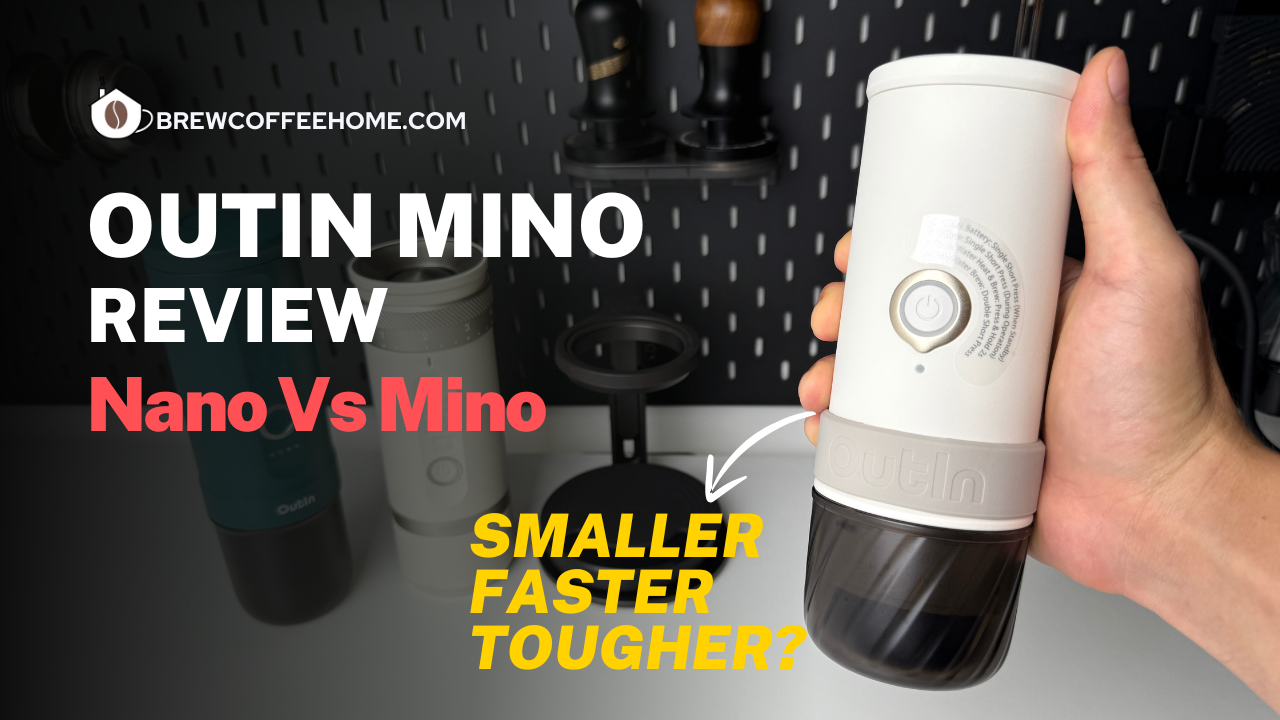After over a week of daily testing with the new Outin Mino, I can tell you this isn’t just another heat and brew portable espresso maker – it’s specifically designed for serious outdoor enthusiasts who need durability without sacrificing coffee quality.
The Outin Mino is open for pre-order, check it out: ➡️https://outin.com/BREWCOFFEEHOME
Here is my Outin Mino hands-on review on my Youtube Channel.
What Makes the Mino Different
The Mino immediately caught my attention when Outin sent it for early testing. While it looks similar to the popular Outin Nano, the differences become clear after testing it.
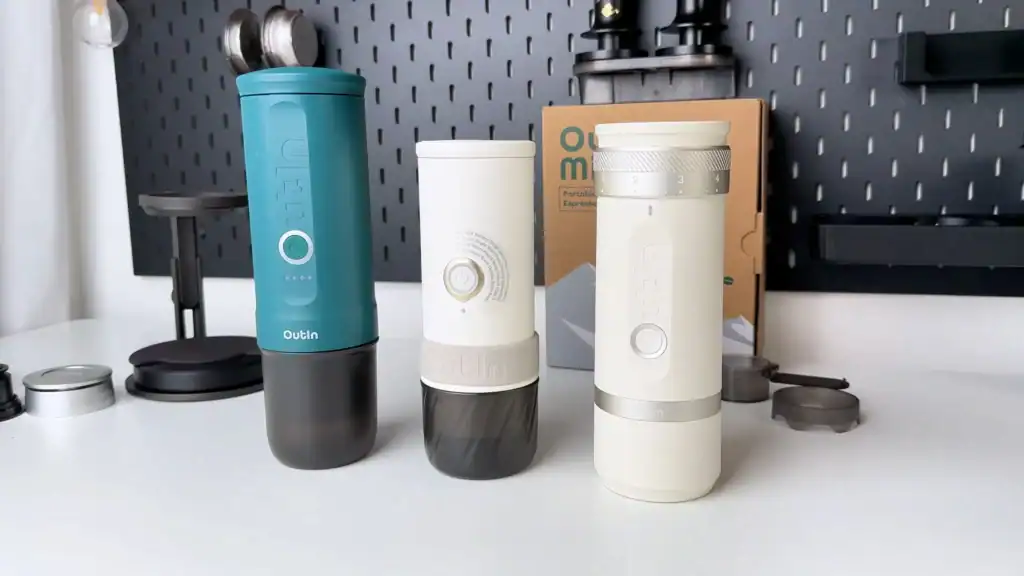
The main upgrades focus on ruggedness and outdoor performance, making this the more specialized option in Outin’s lineup.
First Impressions and Unboxing
The packaging clearly emphasizes outdoor adventure with its design elements, and that’s completely intentional. The coffee maker itself comes in a quality travel bag that feels ready for your next camping trip.
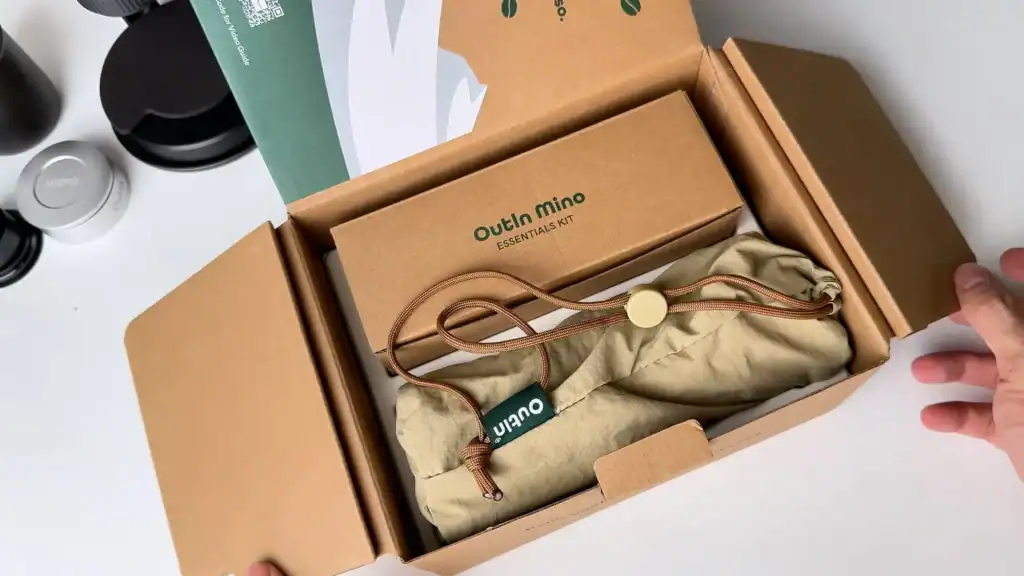
The Essential Kit includes:
- Coffee basket (noticeably larger than the Nano’s)
- Dosing ring for mess-free grinding
- Dual-purpose spoon/tamper
- USB-C charging cable
- Basket removal tool
- Manual and brand stickers
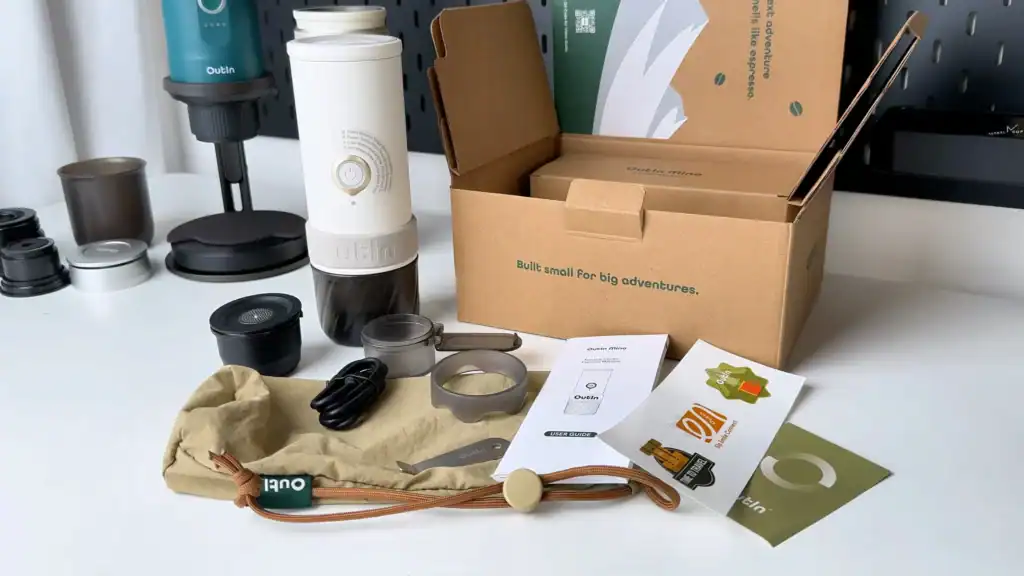
I really like how straightforward the setup is – you’re brewing within minutes of opening the box.
Design and Build Quality Comparison
Size and Portability
The Mino is actually smaller than the Nano, making it easier to pack for adventures. I can easily hold it with one hand, and it fits better in my backpack’s side pocket.
The clever cup design deserves mention. When the knobs align with the machine’s grooves, it locks on as a lid. Align them with the machine’s edge, and it props the whole unit up, leaving space for your cup underneath.
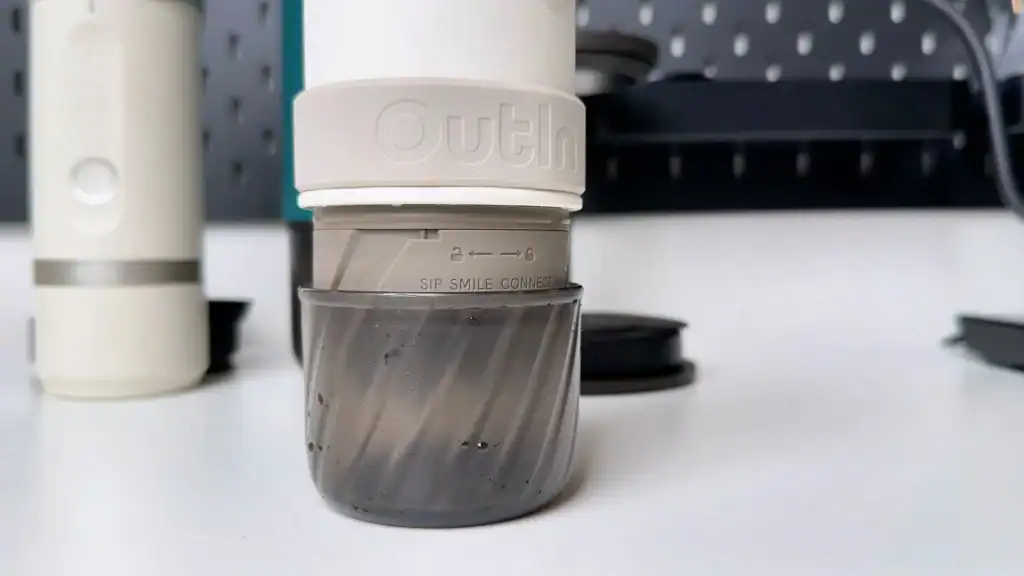
This is why the Mino can be smaller – the Nano needs a taller cup design to accomplish the same thing.
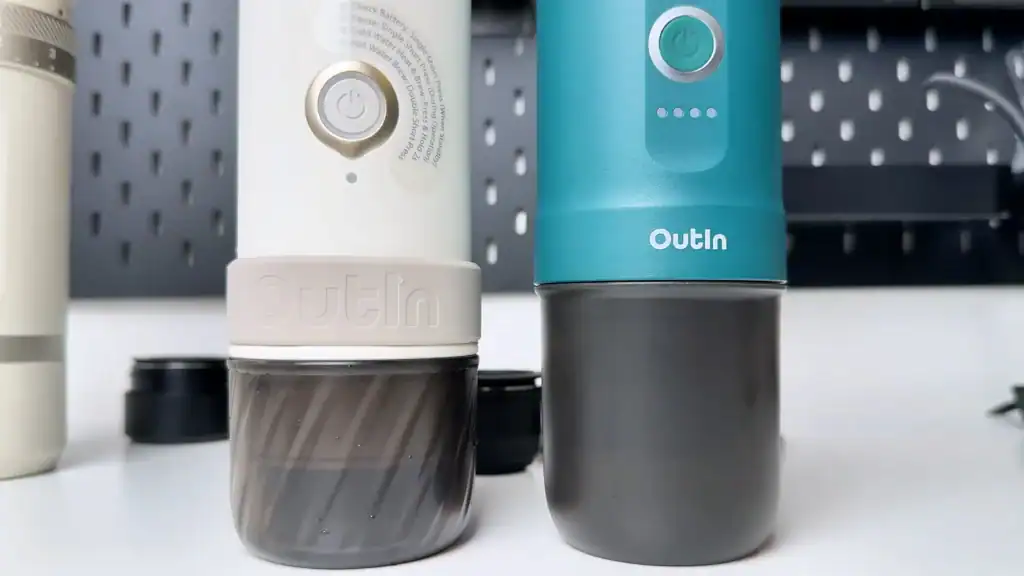
The water tank holds 70 ml of water, and it’s made of stainless steel like the Nano, so no worries about the plastic contact with hot water.
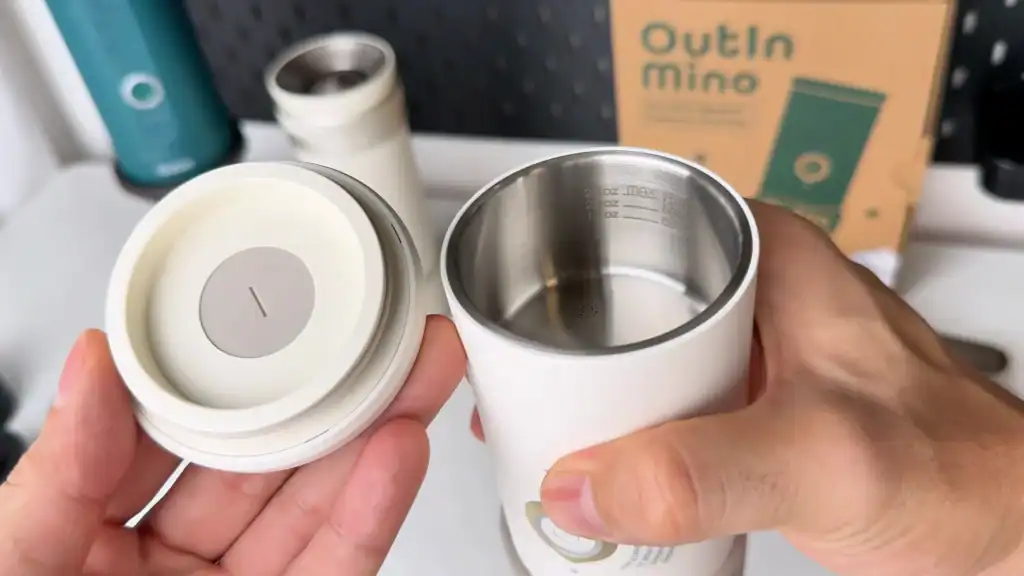
Key Specifications (Nano Vs Mino)
| Feature | Mino | Nano |
| Weight | 680g | 660g |
| Battery | 9,000 mAh | 7,500 mAh |
| Water Capacity | 70ml | 70ml |
| Water Resistance | IP67 | IPX4 |
| Status Lights | LED ring | 4 separate lights |
Durability Upgrades
The IP67 water resistance is a game-changer for outdoor use. I tested this by soaking the Mino in water for two minutes – it worked perfectly afterward.
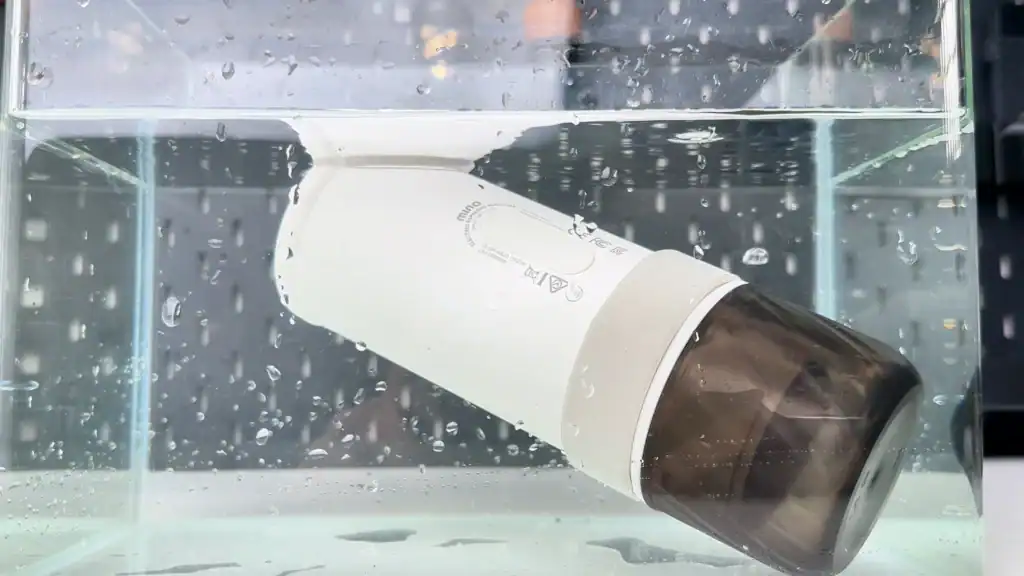
Real-World Usage for the Mino:
Perfect for: Serious outdoor adventures, water sports, extreme weather conditions
- Kayaking trips – if it falls overboard, you can retrieve it and it’ll still work
- Heavy rainstorms – completely weatherproof during sudden downpours
- Stream crossings while backpacking – no worry if it gets dunked briefly
- Beach camping – sand and saltwater spray won’t be an issue
Can handle: Full submersion up to 3 feet deep for 30 minutes (IP67)
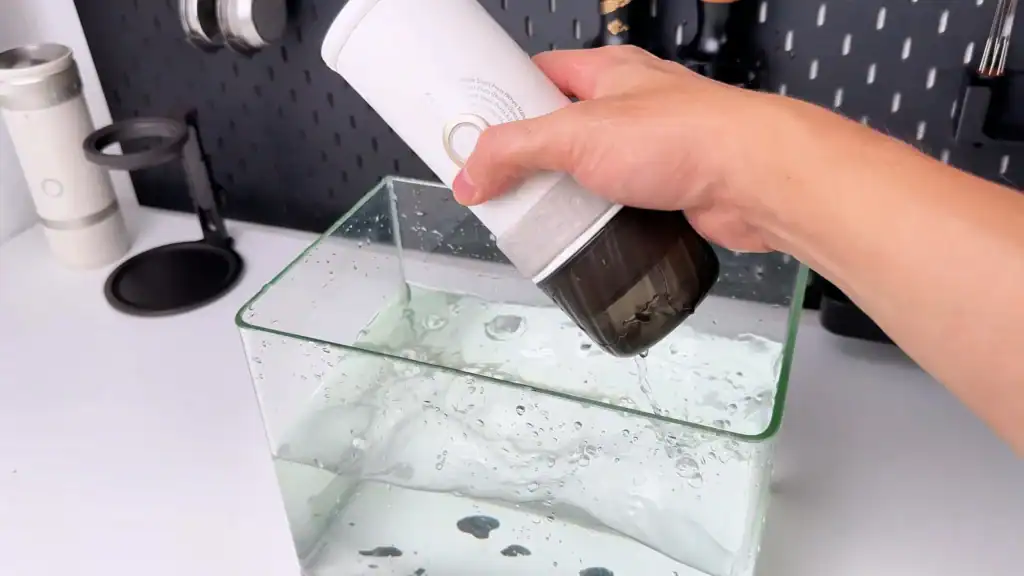
With IP4, the Nano is adepquate for many light outdoors scenes.
Real-World Usage for the Nano:
- Light rain while camping – you’ll need to cover it or bring it inside a tent
- Kitchen splashes when making coffee indoors
- Morning dew on camping tables – wipe it down but don’t worry about damage
- Best for: Car camping, RV trips, covered outdoor cooking areas, and indoor use
This rating difference explains why the Mino costs more and targets serious outdoor enthusiasts. With IP4, you’re constantly managing water exposure with the Nano. With IP67, the Mino becomes a truly worry-free outdoor companion that can handle whatever nature throws at it.
I also tested cold-weather performance by leaving it in my fridge just below freezing for 30 minutes. The Mino fired up normally, supporting Outin’s claims about cold weather and high-altitude operation.
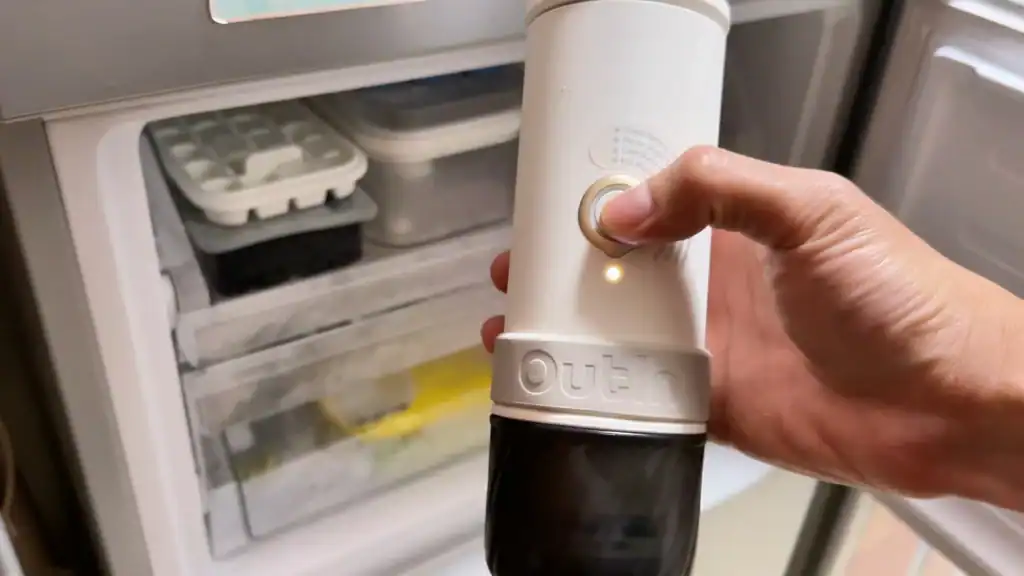
Coffee Basket Comparison
The basket upgrade is significant for coffee quality. The Mino’s basket holds 12 grams versus the Nano’s original 6-8 gram capacity. This means stronger, more satisfying shots without needing the separate Basket Plus accessory.
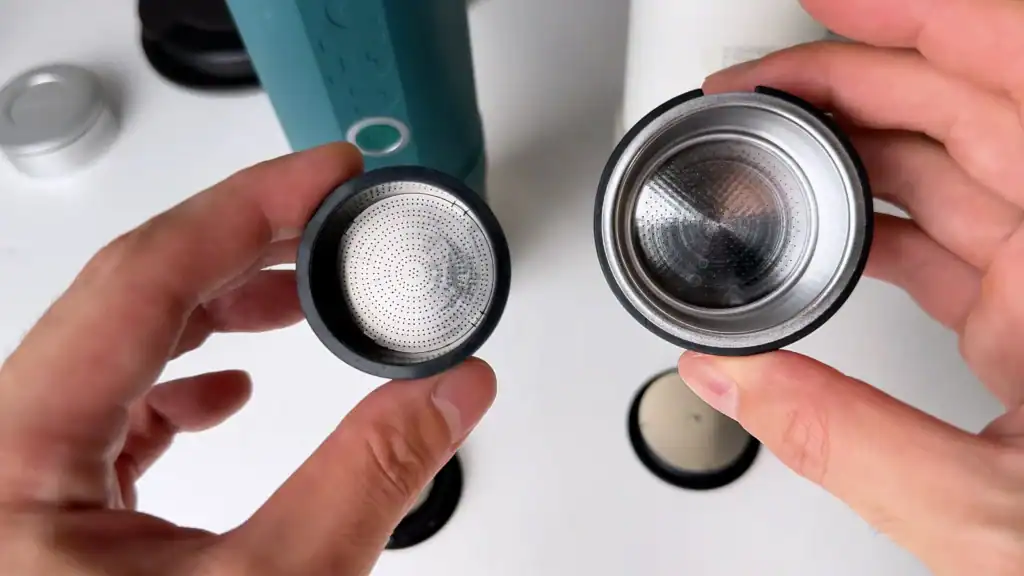
The basket design is interesting – it’s technically non-pressurized, but the holder’s tiny outlet makes it function like a pressurized system. This gives you good crema and forgiving extraction even with slightly inconsistent grinds.
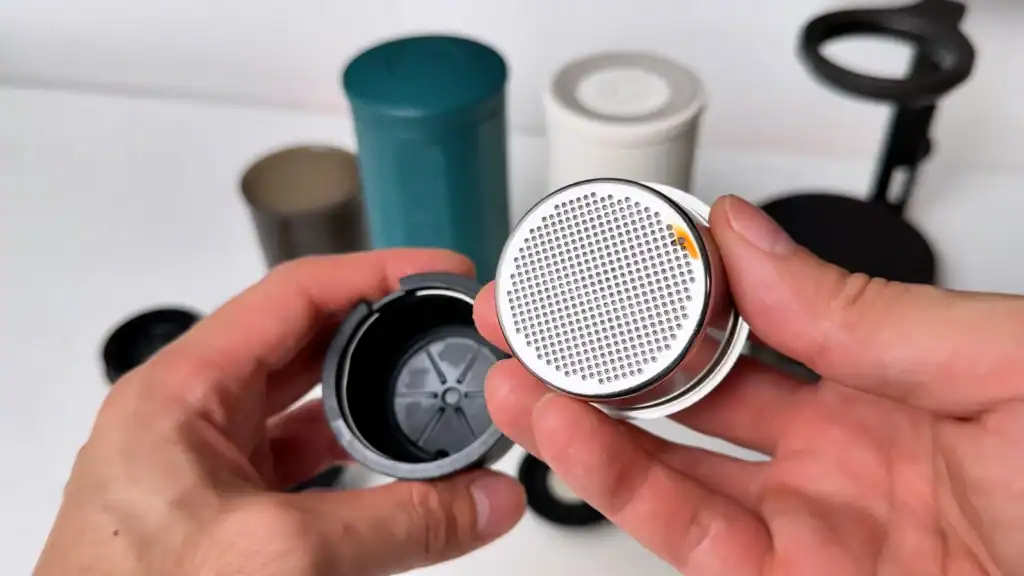
However, the Outin Nano’s Basket Plus isn’t compatible with the Mino. Even though they share the same diameter, the threads are different, so you can’t screw it on.
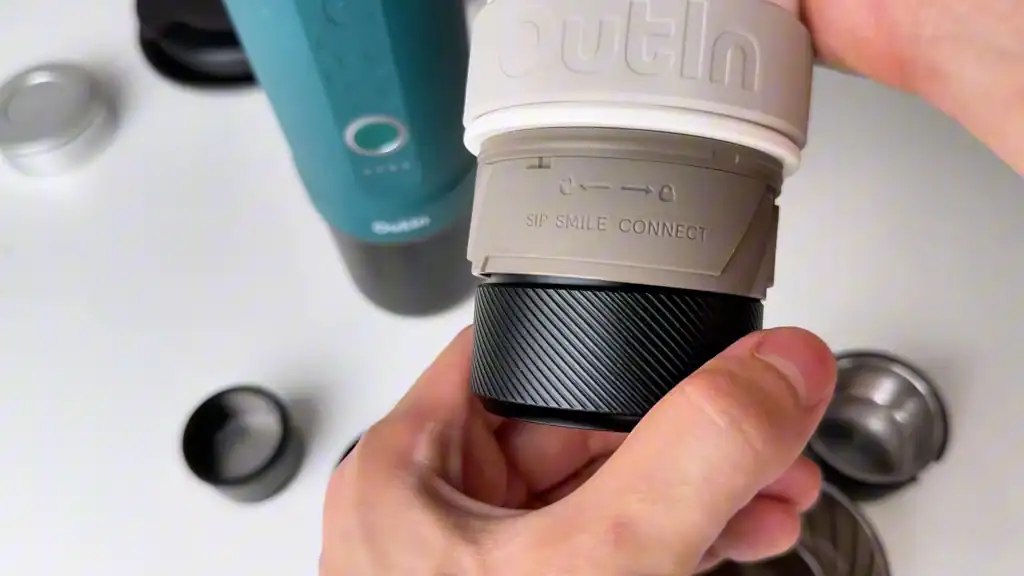
Heating Speed and Capsule Brewing
I tested both machines side-by-side with identical conditions: Nespresso capsules, 50ml of room temperature water (27°C). The results were telling:
Heating Speed:
- Mino: 2 minutes, 24 seconds
- Nano: Just over 3 minutes
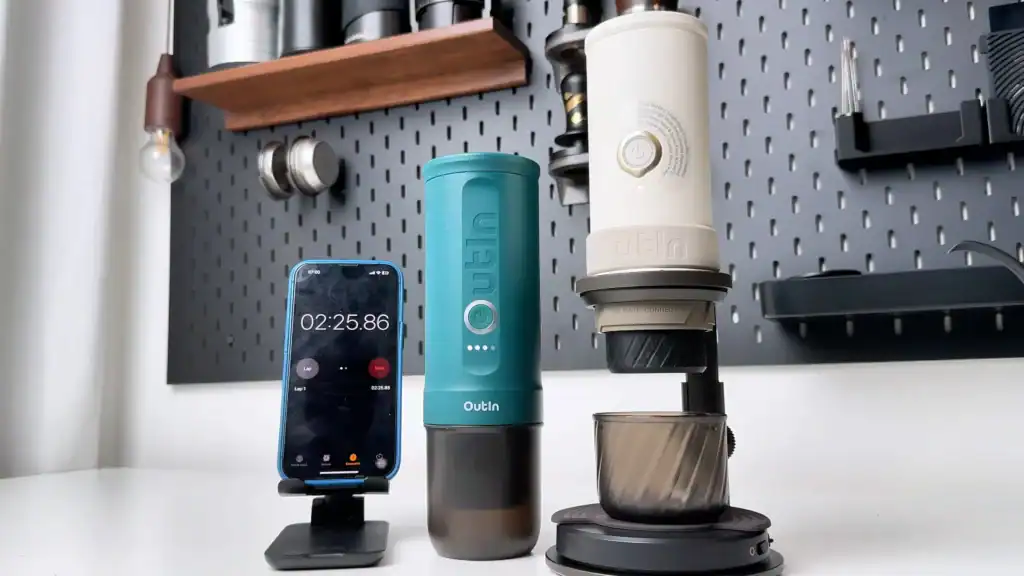
The 30-second advantage adds up when you’re making multiple cups.
Brewing with Capsule
The Outin Nano’s capsule holder looks newly designed. It has a wave-like edge that fits in the holder more securely and improves the seal.
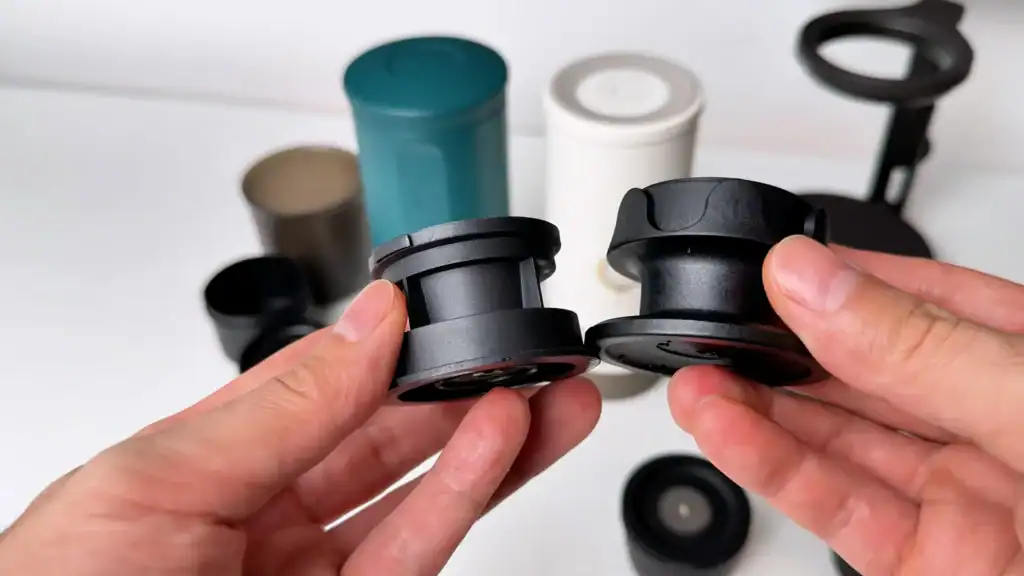
The Mino produced noticeably richer crema that lasted longer. The espresso tasted more intense with deeper flavor compared to the Nano’s lighter profile.
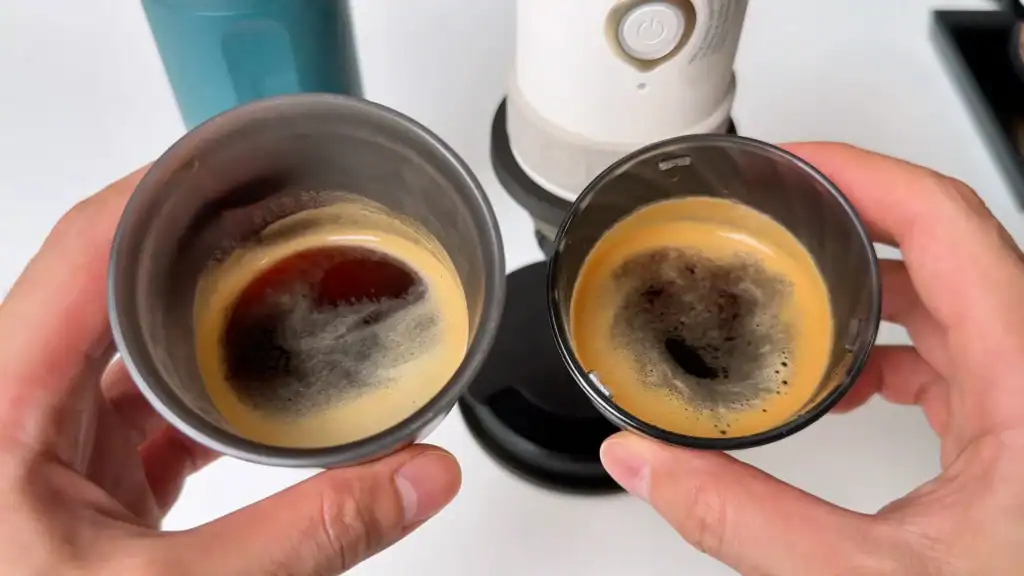
This may be related to the higher pressure on the Mino (22 bars instead of Nano’s 20 bars). Higher pressure is not always better, especially for ground coffee, but for capsules, it seems to make a noticeable difference. The espresso from the Mino tastes more intense, with richer flavor. The Nano is a bit lighter by comparison. Side by side, the difference is easy to notice.
Brewing with Freshly Ground Coffee
Using the Outin Fino grinder with the Mino creates a surprisingly smooth workflow. The dosing ring threads directly onto the basket, letting you pour grounds without spillage. It’s these small design touches that make daily use more enjoyable.
For tamping, I found the included spoon works adequately, though a dedicated WDT tool helps with clump distribution if you have one. The whole process from grinding to extraction takes about 5 minutes once you’re familiar with it.
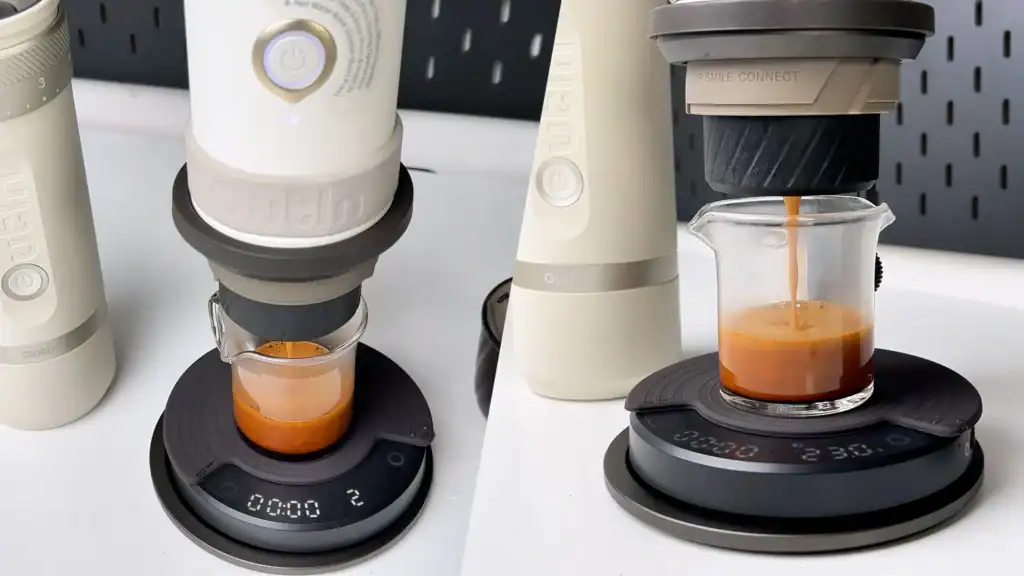
Espresso Shot Quality
The 12-gram shots from the Mino produce rich, satisfying espresso with excellent crema.
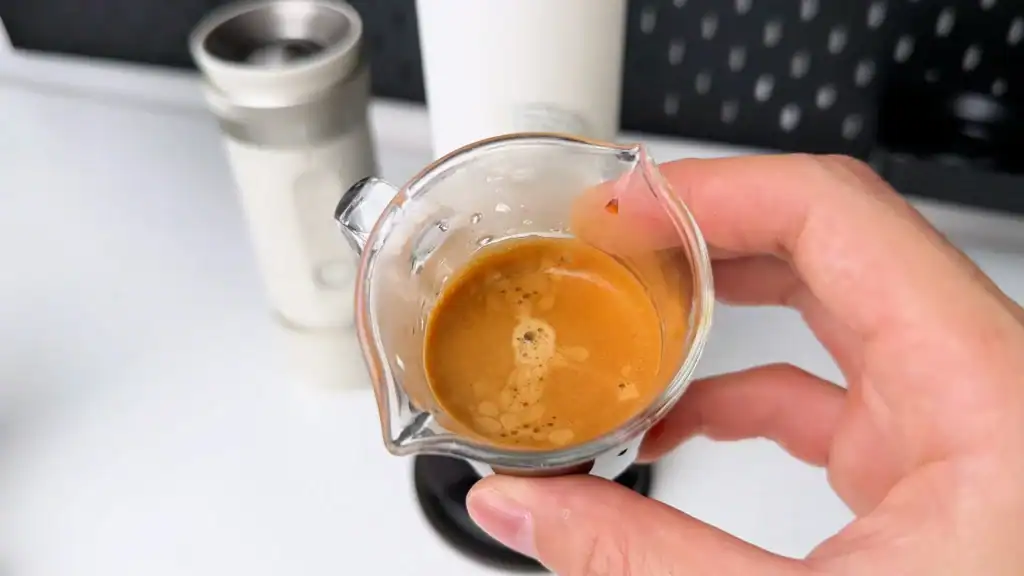
However, when compared side-by-side with the Nano’s Basket Plus (which holds 16 grams), the Basket Plus still delivers a richer, longer shot with better flavor complexity thanks to its larger, non-pressurized basket design.
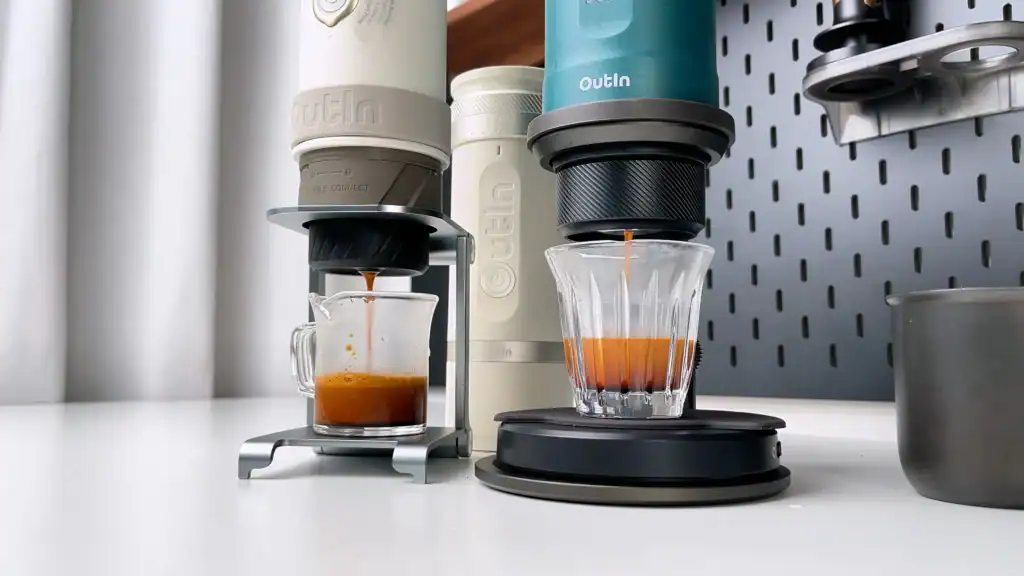
Battery Life Performance
I tracked battery performance under different conditions:
Normal Use: 5 complete heat-and-brew cycles without issues, sometimes 6 if I only fill 50ml of water.
It heats water from 27 to 92 degrees in each brewing cycle.
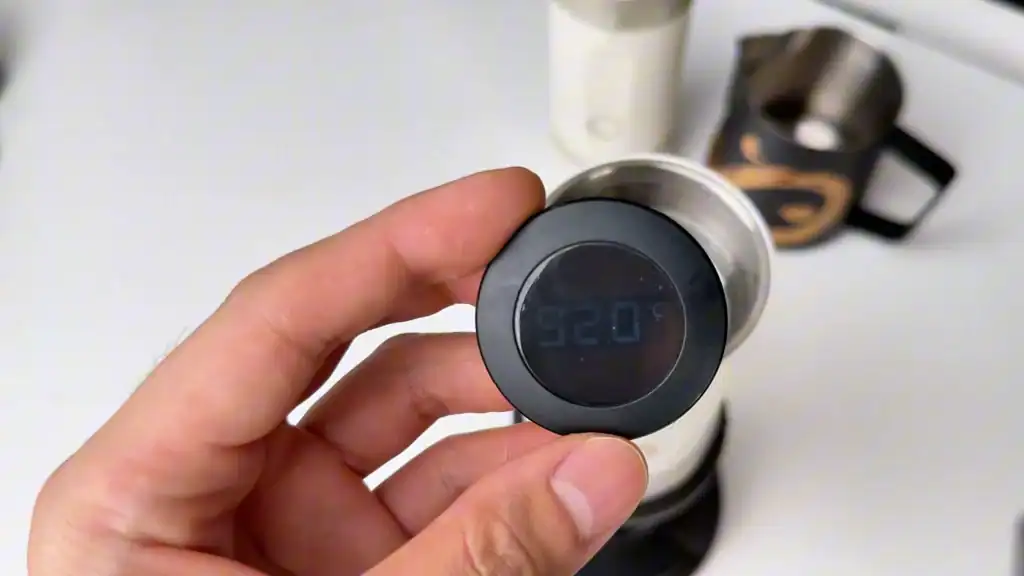
Stress Test: Running continuous 50ml heating cycles back-to-back:
- Mino: 4 complete cycles
- Nano: 3 complete cycles
The continuous test represents worst-case scenario – normal use with cooling time between shots gives you 1-2 additional cycles.
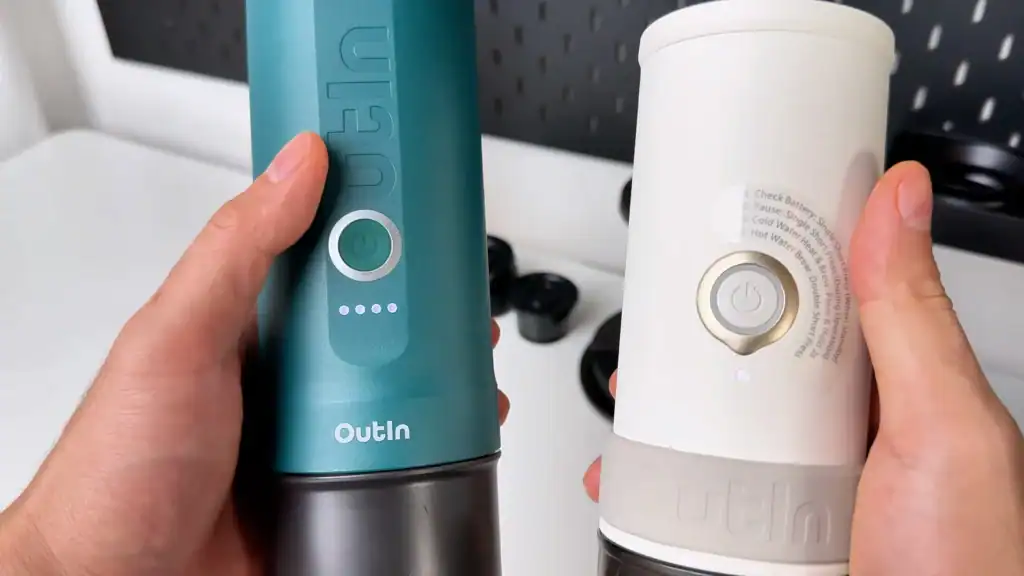
If you use pre-heated water instead of heating from room temperature, the battery can handle significantly more brewing cycles with one full charge.
Cleaning
Cleanup is straightforward but requires the basket removal tool. The 12-gram pucks come out very dense – too dense to knock out by hand. The tool makes removal easy, and since the machine is waterproof, you can rinse everything directly under the tap.
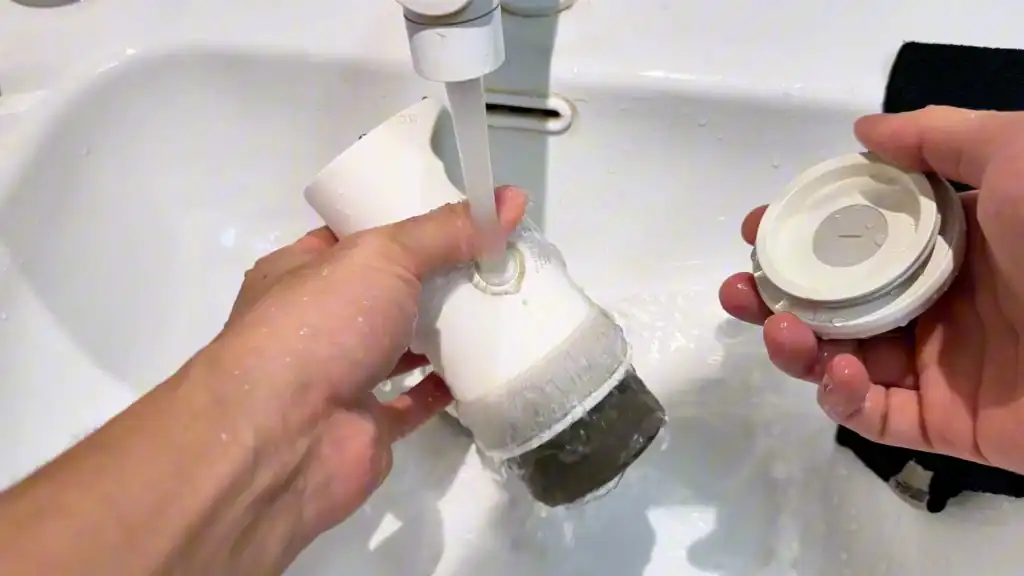
Who Should Choose Which Machine
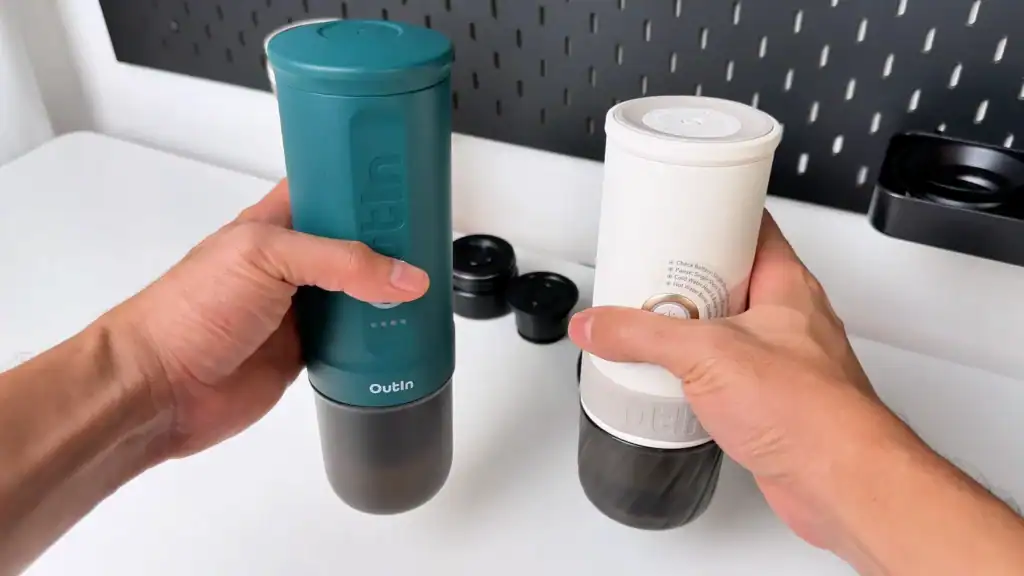
Choose the Mino If:
- You do serious outdoor activities (camping, hiking, kayaking)
- Durability and weather resistance matter
- You want stronger shots without buying extra accessories
- Faster heating time is important
- You prefer a more compact design
Stick with the Nano If:
- You mainly use it for casual travel or daily home use
- You already own the Basket Plus (it won’t fit the Mino)
- Budget is the primary concern
- You don’t need the enhanced durability features
What I’d Love to See in Future Updates
After testing the Mino extensively, it definitely offers brewing improvements over the original Nano. However, as many people in my YouTube comment section have mentioned, we’re all hoping for Basket Plus compatibility in future versions.
The thing is, a non-pressurized basket with that larger 16-gram capacity would let the Mino make more authentic espresso shots. Maybe it’s due to waterproofing concerns or other engineering considerations, but the current version doesn’t support the Basket Plus.
I actually think this could be solved though. You could swap to the original basket for outdoor adventures and use the Basket Plus at home for indoor brewing – that would be the perfect setup for users who want both durability and coffee quality.
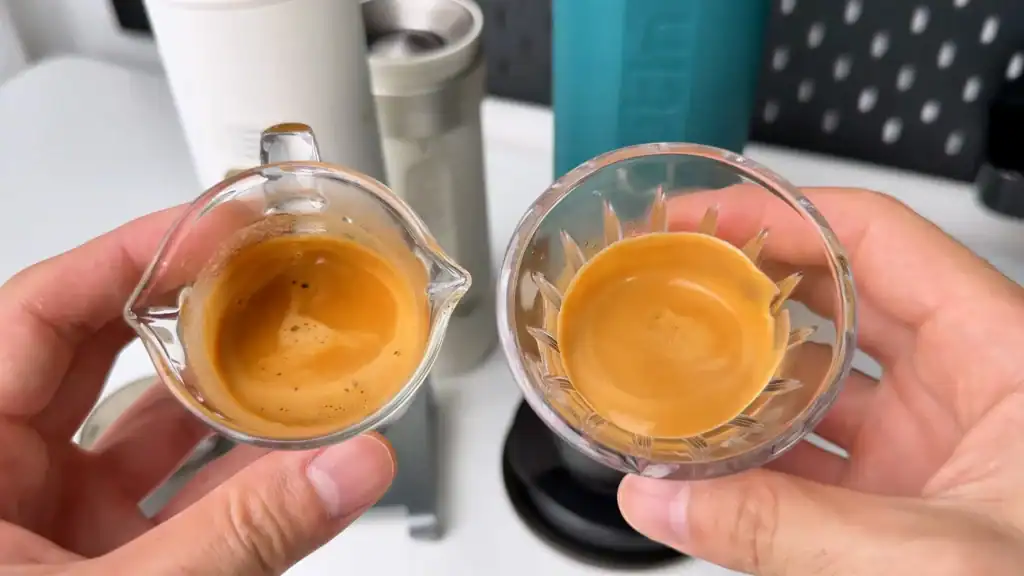
Here’s the reality: the heat-and-brew portable device market is getting more competitive. Companies like Cera, HiBREW, and Wacaco are all offering compatibility with larger non-pressurized baskets. Maybe their outdoor performance isn’t as robust as Outin’s, but they’re focusing heavily on convenience and coffee quality.
Until then, the Mino remains the durability champion, but it’s missing that flexibility that would make it the ultimate all-around portable espresso maker.
The Bottom Line
After extensive testing, the Mino feels like a specialized tool for outdoor coffee enthusiasts rather than a general upgrade. The price point roughly equals a Nano plus Basket Plus, but you’re getting enhanced durability, better weather resistance, and improved performance in harsh conditions.
For weekend warriors and serious outdoor adventurers, the Mino justifies its place in your pack. If you’re looking for everyday convenience or casual travel use, the Nano remains the more practical choice.
Can the Outin Mino use the Nano’s Basket Plus?
No. The threads differ, so the Basket Plus is incompatible.
How long does the battery last?
You can expect 5–6 full heat-and-brew cycles per charge (hundreds of cycles with preheated water). I can get 6 cycles if I heat and brew 50ml of room-temperature water with a full charge in my test.

